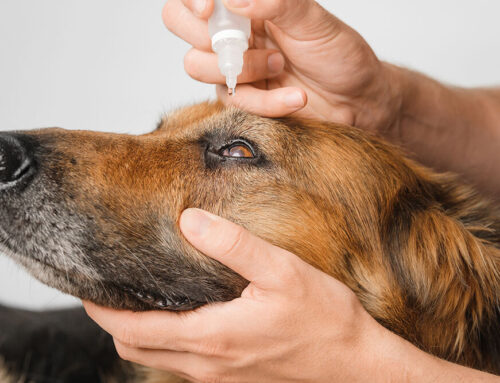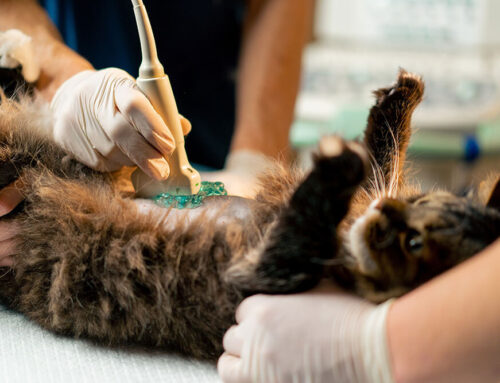In February, we celebrate our love for our furry companions not only on Valentine’s Day, but also month-long during American Heart Month. Heart disease is the leading cause of death in people, and pets are also at risk of developing a potentially devastating heart condition. In fact, more than 15% of all cats and 10% of all dogs in the U.S. will develop some form of heart disease. Older pets, especially senior dogs, are at increased risk of developing heart disease that, unfortunately, often goes undetected. Our Oliver Animal Hospital team wants to ensure pet parents understand heart disease, and know the steps to take if their pet is diagnosed with heart disease.
How does your pet develop heart disease?
Your pet’s heart functions and looks the same as a human heart. The heart consists of four chambers whose function is to pump and oxygenate blood throughout the body. Disruptions in the heart’s vascular flow, or contractility, can lead to a heart murmur, which can be detected during your pet’s veterinary exam. Some pets are born with congenital heart defects that can often be detected when they are young. Older pets who develop heart disease (i.e., acquired heart disease) have an increased risk of congestive heart failure (CHF), which results from the heart’s inability to pump blood normally. CHF can cause fluid accumulation in the lungs and abdomen because of increased stress and weakening of the heart muscle. CHF in pets is fatal without treatment and can be a devastating diagnosis. Heart disease in pets has multiple causes, including:
- Nutritional deficiencies (i.e., amino acids such as taurine)
- Obesity
- Bacterial and viral infections
- Aging
- Genetic defects
- Heartworm disease
- Limited ingredient diets (i.e., grain free diets that contain peas and lentils)
Certain purebred dogs and cats also have an increased risk of developing heart disease. These include Great Danes, Doberman pinschers, Irish wolfhounds, boxers, Newfoundlands, Portuguese water dogs, Dalmatians, cocker spaniels, Cavalier King Charles spaniels, poodles, standard schnauzers, Maine coon cats, Bengal cats, and Sphinxes.
What are heart disease signs in your pet?
Recognizing heart disease signs in your pet may be difficult, especially in the early disease stage. Cats are especially skilled at masking illness, and increased hiding is often the only indication that your pet is sick. Additionally, some cats will experience a silent heart disease that is detectable only through a blood test. Clinical signs will vary depending on your pet’s breed and disease severity, and may include:
- Increased respiratory rate
- Increased heart rate
- Coughing, especially at night or first thing in the morning
- Difficulty breathing
- Fainting
- Decreased appetite
- Weight loss
- Abdominal distention
- Pale gums
- Lethargy
- Exercise intolerance
- Crying or whining in pain
How is heart disease diagnosed in your pet?
Regular preventive care visits with your south Austin veterinarian, especially for older pets and high-risk breeds, are critical for early detection and treatment of heart disease. Your veterinarian will perform a nose-to-tail exam, which will include evaluating your pet’s heart rhythm and rate with a stethoscope, and listening to their lungs. Pets with heart disease may have arrhythmias, or muffled lung sounds, if fluid is present. If your south Austin veterinarian detects heart or lung sound abnormalities, they may recommend the following diagnostic tests:
- Blood pressure — Pets with heart disease often have elevated blood pressure.
- Blood tests — Various blood tests may be used to evaluate your pet’s overall organ function, electrolyte levels, infection presence, nutritional deficiencies, or certain cardiac enzymes and protein levels.
- Electrocardiogram (EKG) — This procedure is used to check for problems with the electrical activity in your pet’s heart.
- X-rays — X-rays allow evaluation of the size and shape of your pet’s heart, and provide an overall view of the lungs and chest cavity.
- Echocardiogram — This specialized ultrasound exam provides real-time visualization of the entire heart and its vessels, to assess overall function and blood flow.
How is heart disease treated and prevented in your pet?
Advances in veterinary medicine have provided multiple, effective heart disease treatments. The ultimate goal is slowing disease progression and ensuring your pet remains comfortable. Medication type and amount will vary based on breed, heart disease type, and severity. Heart disease treatments may include:
- Diuretics to decrease fluid accumulation
- Vasodilators to improve circulation
- Beta blockers to decrease blood pressure
- Oxygen therapy
- Special heart-specific diets (i.e., low sodium pet food)
Medications and treatments will often need adjustment throughout your pet’s life with heart disease, so regular veterinary visits are critical to properly manage their disease.
Can heart disease in pets be prevented?

Depending on the underlying cause of your pet’s heart disease, some preventive measures can be helpful. Like people, maintaining a healthy weight will greatly decrease your pet’s chances of developing heart disease in their senior years. Regular exercise, such as short, frequent walks or indoor playtime, will greatly improve your pet’s mental and physical well-being. Ensure you feed your pet a high quality, complete, and balanced diet that is formulated for their age, breed, and life stage.
Our Oliver Animal Hospital team understands that your pet’s heart disease diagnosis can be a huge concern. We recommend regular preventive care visits to ensure an early diagnosis and increased chance of a successful outcome. Call our office if you have any questions about your pet’s heart health, or schedule an appointment if you are concerned they may be showing heart disease signs.








Leave A Comment